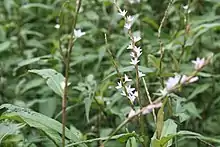Persicaria minor
Persicaria minor is a herb species of the family Polygonaceae, with synonym Polygonum minus, and is also known by the common names small water-pepper, small smartweed, pygmy smartweed, spotted lady's thumb, kesum (Malay) and Kleiner Knöterich (German). This herb is native to Asia, but distributed widely in Europe and Australia.[2] It is used in South East Asian cooking.
| Persicaria minor | |
|---|---|
 | |
| Scientific classification | |
| Kingdom: | Plantae |
| Clade: | Tracheophytes |
| Clade: | Angiosperms |
| Clade: | Eudicots |
| Order: | Caryophyllales |
| Family: | Polygonaceae |
| Genus: | Persicaria |
| Species: | P. minor |
| Binomial name | |
| Persicaria minor (Huds.) Opiz | |
| Synonyms[1] | |
|
Polygonum minus Huds. | |
Description
Persicaria minor is native to South East Asia, including Malaysia, Thailand, Vietnam and Indonesia.[3] It grows wild in cooler highlands, but is also found in wet lowland areas near rivers, ditches, and canals. It is a creeping plant with slender stems, and grows upright to a height of 1 to 1.5 meters. The creeping stem is green with reddish tinge, is cylindrical in shape, and has short nodes about 9 mm apart. Its leaves are long and narrowly-tapering, alternately arranged, and green with short, reddish petioles. Its flowers are minute, pale violet, and are 12 to 15 cm long.[4]
Uses
Persicaria minor is an edible herb. In Malaysia and Singapore, the shoots and young leaves are eaten raw as part of salad (ulam); used as an aroma spice additive in peppery dishes such as laksa, nasi kerabu, asam pedas and tom yam; used as tea leaves; and used for topical applications.[5] Its oil has been used for aromatherapy and in treatments for dandruff.
In Malaysian traditional medicine, P. minor has been used in post-natal tonics and for treatment of digestion.[4]
Pharmacological studies on P. minor have indicated anti-oxidant, LDL oxidation, anti-inflammatory and anti-microbial activities,[6] digestive enhancing and anti-ulcer activities,[7] as well as cognitive enhancing activities.[8] Comparative studies have been carried out to analyse the metabolites not only in the plant's leaves, but also in its stem and roots.[9]
Compared with other four Malaysian herbs (Cosmos caudatus, Piper sarmentosum, Centella asiatica, Syzygium polyanthum), the Persicaria minor showed the highest concentration of phenols and the highest antioxidant activity. It has been used as a bioactive component for packaging film for edible foods, based on a semi-refined carrageenan and glycerol as plasticizers.[10]
References
- Tropicos, Persicaria minor (Huds.) Opix
- "Persicaria minor (Huds.) Opiz". New England Wild Flower Society. Retrieved 2017-03-28.
- Wan Hassan, W.E (2010). Ulam: Salad Herbs of Malaysia. Masbe. pp. 190–191. ISBN 9789834466404.
- Samy, Joseph; Sugumaran, M.; Lee, Kate (2005). Herbs of Malaysia. Times Editions - Marshall Cavendish. pp. 198–199. ISBN 9833001793.
- Kilham, Chris (2017-02-26). "South Asian herb dubbed 'smart weed'". FoxNews.com. Retrieved 2017-08-11.
- Christapher, Parayil; Parasuraman, Subramani (2015). "Review on Polygonum minus. Huds, a commonly used food additive in Southeast Asia". Pharmacognosy Research. 7 (1): 1–6. doi:10.4103/0974-8490.147125. PMC 4285636. PMID 25598627.
- Qader, SW; Abdulla, MA (2012). "Pharmacological mechanisms underlying gastroprotective activities of the fractions obtained from Polygonum minus in Sprague Dawley rats". International Journal of Molecular Sciences. 13 (2): 1481–1496. doi:10.3390/ijms13021481. PMC 3291972. PMID 22408403.
- George, A; Ng, CP (2014). "In vitro and ex-vivo cellular antioxidant protection and cognitive enhancing effects of an extract of Polygonum minus Huds (Lineminus™) demonstrated in a Barnes Maze animal model for memory and learning". BMC Complementary and Alternative Medicine. 14: 161. doi:10.1186/1472-6882-14-161. PMC 4036647. PMID 24886679.
- Ahmad, R; Baharum, SN (2014). "Volatile profiling of aromatic traditional medicinal plant, Polygonum minus in different tissues and its biological activities". Molecules. 19 (11): 19220–42. doi:10.3390/molecules191119220. PMC 6271663. PMID 25420073.
- Wan Amnin Wan Yahaya; Noraziah Abu Yazid; Nurul Aini Mohd; Azmanand María Pilar Almajano (July 1, 2019). "Antioxidant Activities and Total Phenolic Content of Malaysian Herbs as Components of Active Packaging Film in Beef Patties". Antioxidants. Basel. 8 (7): 204. doi:10.3390/antiox8070204. PMC 6680856.
External links
| Wikimedia Commons has media related to Persicaria minor. |